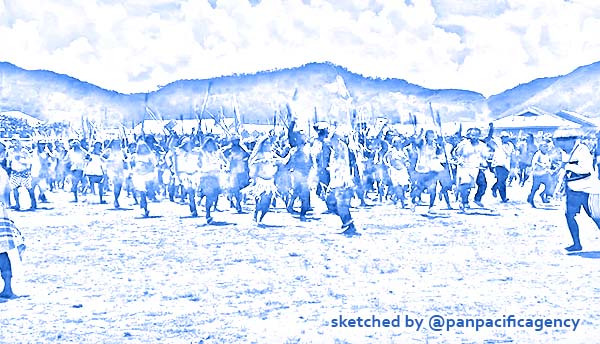Indonesian govt gets to grips with Papua

Thousands of people in Dogiyai regency in Papua rally against racism and demand referendum on Aug. 26. (Handout). Sketched by the Pan Pacific Agency.
JAKARTA, Aug 31, 2019, The Jakarta Post. President Joko “Jokowi” Widodo’s administration is scrambling to end two-week long unrest in Papua and West Papua as rival groups of protesters have begun to clash on the streets of Jayapura, reported The Jakarta Post.
Residents, many of whom are believed to be nonindigenous Papuans, took action on Friday against Papuan protesters who, the former claimed, had rioted and vandalized the main roads and facilities connecting Abepura and Entrop districts with the city center, during anti-Jakarta rallies in the city.
A string of protests broke out in cities and regencies in the provinces following physical and racial abuse against Papuan students by security personnel in Surabaya, East Java on Aug. 16.
Jokowi held a Cabinet meeting on Friday night to address the crisis, after Coordinating Political, Legal and Security Affairs Minister Wiranto held a dialogue in Jakarta earlier that day with several Papuan and West Papuan leaders to end the riots.
The figures included retired Navy officer and former minister Freddy Numberi, Golkar Party politician Yorrys Raweyai, youth leader Samuel Tabuni and former diplomat Theofilus Waimuri.
Concerns were mounted from the Papuan figures that the security situation in the provinces would continue to worsen if the government refused to open dialogues.
Samuel, a young figure from Nduga, another conflict-stricken regency in Papua, and also the director of Papua Language Institute, urged the government to hold peaceful dialogues with protesters instead of using force to end the protests.
“Almost all who protested were young Papuans. If they aren’t embraced and given the room to be involved in creating national and provincial policies, then Papua won’t have a future. Therefore, I’m asking for the President and all Cabinet members to ensure law enforcement, unlike the case in Surabaya, in which we had to protest first before the law was enforced,” he said.
Anti-Jakarta rallies in the easternmost provinces have descended into violence since the government has taken a heavy-handed approach, including deploying more security personnel in the provinces. It has also blocked internet access, arguing that it would prevent misinformation that would worsen unrest.
At least one military member and two civilians died in a riot in Deiyai, Papua.
Jokowi directly held the meeting on Friday night after returning from a visit to Yogyakarta. There have been mounting calls for the government, including Jokowi himself, to conduct a dialogue with residents in the provinces to end the crisis.
“I order that the situation in Papua should be maintained and restored and all citizens, without exception, should be protected,” he said before the meeting.
Security sources confirmed that some residents had blocked roads and conducted sweeps against suspected protesters, with Papua Cendrawasih Military Command saying it had prepared measures to anticipate any possible clashes between the groups.
Wiranto said the government had taken measures to enforce the law against suspected racial attackers in Surabaya, including two civilians and five military personnel.
He also said, as of Friday morning, the minister said West Papua had relatively cooled down even though there were still plans for future rallies, while demonstrations were still going on in Papua as security forces tried to negotiate with protesters.
“From the discussion we have agreed to first and foremost end the tensions with the anarchist demonstrations there and recover the regions’ stability. […] We will correct what has been wrong so that future developments of Papua and West Papua could be more integrated and conducive to the regions’ prosperity,” he told the press after meeting the Papuan leaders.
Wiranto called on Papuans and West Papuans to channel their aspirations through peaceful dialogues instead of rallies, which he claimed had been “engineered by irresponsible parties”, although he refused to disclose said parties to avoid further complicating the situation.
Amnesty International Indonesia director Usman Hamid said that peaceful dialogues with indigenous Papuans and West Papuans should have been done before riots erupted in the provinces.
He went on to say that such an approach would not be enough without the enforcement of the rule of law that has to take into account not only the recent but also past human rights abuses suffered by the people.
‘“Resolution through dialogues and law enforcement requires the government to change its mind-set that for long has been rigid in regard to the NKRI [Unitary State of the Republic of Indonesia] as a fixed price, shutting the doors for open dialogues,” Usman said.
Open dialogues would have to accommodate all Papuans’ aspirations, he said, suggesting that the government open communication channels with the United Liberation Movement for West Papua (ULMWP), that has long reflected the strategic power-holders in Papua.